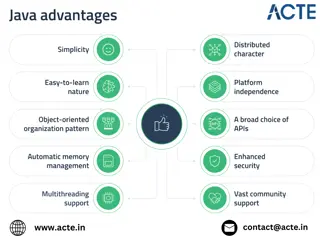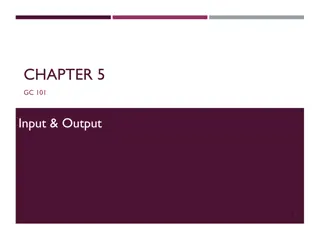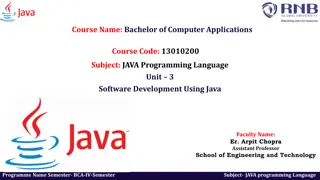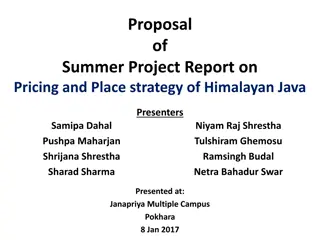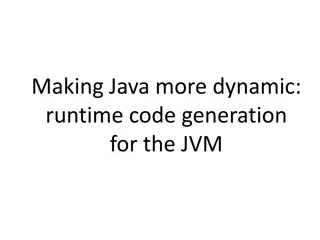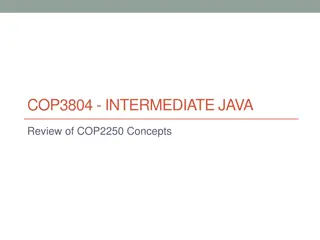Value-Returning vs. Void Methods in Java
The concepts of value-returning and void methods in Java programming. Learn about different types of methods like print, nextInt, and how they function in a Java program's flow of control. Understand the process of calling and defining methods, along with examples and explanations to grasp their significance in Java programming.
Uploaded on Mar 10, 2025 | 3 Views
Download Presentation

Please find below an Image/Link to download the presentation.
The content on the website is provided AS IS for your information and personal use only. It may not be sold, licensed, or shared on other websites without obtaining consent from the author.If you encounter any issues during the download, it is possible that the publisher has removed the file from their server.
You are allowed to download the files provided on this website for personal or commercial use, subject to the condition that they are used lawfully. All files are the property of their respective owners.
The content on the website is provided AS IS for your information and personal use only. It may not be sold, licensed, or shared on other websites without obtaining consent from the author.
E N D
Presentation Transcript
Outline Value-returning Methods methods from Scanner and String methods from Math Creating our own value-returning methods return type and the return command
Last Time void Methods just do something print the introduction, print a report, pause, method call with arguments printReport(length, width); method definition with parameters public static void printReport(int len, int wid) { int area = len * wid; System.out.println("The area of a " + len + "x" + wid + " rectangle is " + area + "."); } The call tells the computer to do something; the definition says how to do it.
Named Instructions Calling the method makes the computer run those instructions running a program = calling main Someone wrote instructions for printing saved them in a method called print put that method into System.out call System.out.print = run those instructions Someone wrote instructions for reading an int call kbd.nextInt = run those instructions
Flow of Control You ask System.out to print Hello computer stops working on your program (for a moment) & takes Hello to the print method the steps of the print method are followed to completion Hello appears on the screen your program starts up again, right where it left off
Flow of Control You ask kbd to get the next int computer stops working on your program (for a moment) & starts doing the nextInt method the steps of the nextInt method are followed to completion, getting an int from the user that int is brought back to your program your program starts up again, right where it left off, with that int where kbd.nextInt is/was
Two Kinds of Methods Methods like print: void methods System.out.print("Hello, "); System.out.println("World!"); just do something Methods like nextInt: value-returning methods num = kbd.nextInt(); answer = kbd.next(); upperAnswer = answer.toUpperCase(); get or create a value
void Methods We have only used the print methods System.out.print("Hello, ") System.out.println("World!") Appear as a whole command on their own not part of an assignment statement unlike num = kbd.nextInt() not condition part of an if or while unlike if (answer.startsWith("yes")) trying to use them a different way is wrong get the red squiggly underlines
Value-Returning Methods Most of the ones we ve used so far Used in assignment statement: num = kbd.nextInt(); answer = kbd.nextLine(); upperAnswer = answer.toUpperCase(); Used as if/while condition: if (answer.startsWith("yes")) { } Can be used as a complete command: kbd.nextLine(); // don't care what they typed
Exercise Void or Value-Returning? win.setVisible(true); distance = Math.hypot(x1 x2, y1 y2); area = Math.PI * Math.pow(radius, 2); root.add(okButton, 0, 3, 2, 1); if (myList.isEmpty()) { } myList.add(10); while (it.hasNext()) { } Are you sure about the void ones?
Things We Can Ask a Scanner We can ask a Scanner (e.g. kbd): to get the next int nextInt() to get the next double nextDouble() to get the next word next() to get the next line nextLine() to get the next boolean nextBoolean() user must type true or false We will learn more Scanner methods later
Things We Can Ask a String We can ask a String (e.g. answer): if it equals another String equals("yes") ditto, but ignoring case equalsIgnoreCase("yes") if it starts with some String startsWith("y") what it would be in all capitals toUpperCase() ditto, but small letters toLowerCase() how many characters it has length() We will learn more String methods later
Return Types Each method returns one kind of value kbd.nextInt() returns an int value kbd.nextDouble() returns a double value kbd.next() returns a String value answer.toUpperCase() returns a String value answer.startsWith("yes") returns a boolean value Math.sqrt(10) returns a double value the square root of 10 Math.pow(radius, 2) returns a double value radius squared (radius2)
Using Return Values The value returned replaces the method call you can save the result to a variable: bestScore = Math.max(testScore, examScore); Math.max call replaced with maximum of the two given test scores; bestScore is set to that value you can send the result to another method: System.out.println(Math.pow(5, 2)); Math.pow(5, 2) replaced with 25.0; it gets printed you can include it in a larger expression: root = (-b + Math.sqrt(b*b 4*a*c)) / (2 * a);
More Math Methods Lots of useful methods found in Math Math.pow(x, y) returns xy Math.max(a, b) returns maximum of a and b Math.min(a, b) returns minimum of a and b Math.sqrt(x) returns square root of x Math.log(x) returns natural log of x Math.log10(x) returns log10 of x Math.sin(theta) returns sin of theta also cos, tan, asin, acos, atan theta is in radians (not degrees)
Yet More Math Methods Rounding off (int)Math.round(x) x rounded to nearest int (int)Math.rint(x) same(!) NOTE the (int) Math.round returns a long value Math.rint returns a double (!) Random numbers Math.random() returns a random number in [0,1) might be zero; won t ever be one 1 + (int)(6 * Math.random()) returns 1, 2, 3, 4, 5 or 6
Exercise Assuming the code below is correct, what kind of value does each method return? double x, y = 3.2; int n = 42; String name = "Mark"; boolean good; name = name.replaceFirst("a", "o"); x = Math.exp(y); n = Math.getExponent(x); good = (name.equalsIgnoreCase("mork"));
Arguments Arguments are given to the method we also say that the method takes arguments Math.sqrt(10) 10 is the (only) argument sqrt knows how to find the square root of a number but need to tell it what number to find the square root of Math.pow(5, 2) 5 and 2 are both arguments pow knows how to raise a number to a power but need to tell it what number to raise to what power arguments must be in the right order! Math.pow(2, 5) is 25, not 52
Why Arguments? Methods may need extra information what should it print? System.out.println("This!") what number do you want the square root of? Math.sqrt(thisNumber) what power of what number? Math.pow(thisBase, thatExponent) what should I check to see if I start with? answer.startsWith("this") kbd.nextInt()doesn t need any extra information
Argument Types Arguments must be the right type! Math.pow("fred", true) makes no sense! the two arguments must be numbers doubles are OK: Math.pow(3.7, 1.98) name.startsWith(7) makes no sense! the argument must be a String: name.startsWith("7") There must be the right number of them! Math.pow(5) makes no sense! Math.pow(1, 2, 3) makes no sense!
Exercise Assume the calls below are correct. What argument type(s) does each method take? Math.getExponent(3400.2) Math.ulp(2.6) Math.scalb(4.5, 2) str.split(":", "one:two:three:four") str.length() thingy.doesItDo("2", 2, 2.0, "to", "too", "two")
Making Methods So far we ve only done void methods all start with public static void public static void main(String[] args) { } private static void printIntroduction() { } private static void pause() { } private static void drawRectangle(int hgt, int wid) { } Value-returning methods replace void with the method s return type private static doublesqrt(double x) { } private static boolean startsWith(String s) { }
RectangleArea: calculateArea Purpose of the method is to calculate the area of a rectangle of a given length and width needs to be given the length and width needs to return the area we will save the result in the variable area recall that in RectangleArea, we use int values int area; area = calculateArea(length, width);
Return Types New method has a return type: int private static int calculateArea(int length, int width) { } int replaces the word void same as data type of area the variable we saved the result in says that this method will return an int value programmer must tell it what value to return
Returning a Value Area is product of length and width private static int calculateArea(int length, int width) { area = length * width; } problem: area is not recognized it belongs to main, not calculateArea so declare it here private static int calculateArea(int length, int width) { int area; area = length * width; } but there s still a problem
Returning a Value Don t say what to do with the area private static int calculateArea(int length, int width) { int area; area = length * width; } need to return the value to main return command private static int calculateArea(int length, int width) { int area; area = length * width; return area; }
RectangleArea: readDimension Recall our steps for reading length and width System.out.print("Enter the length of the rectangle: "); length = kbd.nextInt(); kbd.nextLine(); System.out.print("Enter the width of the rectangle: "); width = kbd.nextInt(); kbd.nextLine(); Would be nice if we could do this: length, width = readLengthAndWidth(); not a statement ';' expected We will learn how to do something like this later, tho
One Return Value; No Changesies Methods can only return ONE value length and width are two separate values Can t change variables in a different method length = 10; changeLength(length); System.out.println("length == " + length); private static void changeLength(int length) { length = 20; } length == 10 Parameter length is not used This is called pass-by-value Some languages allow pass-by-reference
Two Methods? One for length, another for width? length = readLength(); width = readWidth(); The readLength method definition: private static int readLength() { Scanner kbd = new Scanner(System.in); int length; System.out.print("Enter the length of the rectangle: "); length = kbd.nextInt(); kbd.nextLine(); return length; } This works, but readWidth will be almost exactly the same as readLength.
Same and Different See what s the same, and what s different: Enter the length of the rectangle: 10 Enter the width of the rectangle: 20 prints "Enter the of the rectangle" prints length or width where the is reads an integer value Can just tell it which word to print length = readDimension("length"); width = readDimension("width");
Multiple Calls to a Method Call once to read length; again to read width need to tell the method what to prompt for length = readDimension("length"); width = readDimension("width"); method reads one integer value each time and returns one value each time put what it returns into the appropriate variable prompt for length save length prompt for width save width
readDimension Body Argument says which dimension to ask for need our own local variables private static int readDimension(String dimension) { Scanner kbd = new Scanner(System.in); int result; System.out.print("Enter the " + dimension + " of the rectangle: "); result = kbd.nextInt(); kbd.nextLine(); return result; }
Run the Program Again It works properly! run: This program calculates the area of a rectangle. Press enter Enter the length of the rectangle: 10 Enter the width of the rectangle: 20 The area of a 10x20 rectangle is 200. BUILD SUCCESSFUL
Variable Names Note that readDimension returns an int value it does not decide what to do with that value main decides what to do with that value length = readDimension(" ") save in length width = readDimension(" ") save in width That number named value in readDimension but it doesn t matter to the computer could call it length, or width, or area, or ludicrous method will still do the same thing but it does matter to other programmers
Adding Javadocs with NetBeans Insert a blank line just above method header Type /** on that line and press enter NetBeans fills in a javadoc comment template private static int readDimension(String dimension) { Scanner kbd = new Scanner(System.in); int answer; System.out.print("Enter the length of the rectangle: "); answer = kbd.nextInt(); kbd.nextLine(); answer = kbd.nextInt(); answer = kbd.nextInt(); private static int readDimension(String dimension) { /** /** private static int readDimension(String dimension) { Scanner kbd = new Scanner(System.in); int answer; System.out.print("Enter the length of the rectangle: "); System.out.print("Enter the length of the rectangle: "); */ private static int readDimension(String dimension) { Scanner kbd = new Scanner(System.in); int answer; * @return * * @param dimension
Filling in the Javadoc Comment Type the purpose on the second line add more lines as required; add a blank line after Describe every parameter (on @param lines) Describe the return value (on @return lines) /** * Read one dimension (length or width) of a rectangle. * * @param dimension the name of the dimension to read * @return the user-given value of that dimension */
NetBeans Navigation Pane Bottom-left side of IDE window double-click method to jump to its definition hover to see its javadoc remind you in case you forgot what it s for
Exercise Write methods to: print a given line and a blank line after it. given means given to the method calculate f(x) where f(x) = 2x3 3x + 5. print the sum of three given numbers. sum three given numbers. what s different from the previous question?
Back to Greesie Burger Wanted to check answer to see if yes or no lots of ways to say yes several ways to say no Needed to check for yes twice: while (!answer means yes and !answer means no) get another answer if (answer means yes) add fries to the order Methods would be helpful
Great Way to Create Method Available in NetBeans type the code you want in the place you want it select the bit you want in your method select Refactor > Introduce > Method fill in method name click Ok
Boom! NetBeans makes the changes you need creates method call creates required method you make corresponding change to other code unless NetBeans does it automatically which it might while (!meansYes(answer) && !answer.startsWith("no")) {
Public vs. Private NetBeans defaults to making methods private that is OK private can only be used inside this class public other classes can use this method Do you want other classes to use this method? Math, Scanner, and String do want others to use so they declare methods public so far, we don t care! make it public or leave it private. Whatevs! Later we will learn when to make it public and when to make it private.
Revising meansYes If you change the list of words in meansYes e.g. add "sure" as an option and maybe tell it to ignore case private static boolean meansYes(String word) { return word.equalsIgnoreCase("yes") || word.equalsIgnoreCase("yeah") || word.equalsIgnoreCase("ok") || word.equalsIgnoreCase("fine") || word.equalsIgnoreCase("sure"); } change applies in both places (if and while)
Exercise Create a method for meaning No. adjust by using equalsIgnoreCase, by adding new words that mean no, nah, nope, not(?), ? Any changes made to the method definition will apply in the while loop because the while loop calls this method this method says what to check for
Stubs When you start a method you might not have the code you need printTitle("My Program Title"); can still ask NetBeans to create the method creates a stub a definition with degenerate body private static void printTitle(String my_Program_Title) { throw new UnsupportedOperationException(" ."); } just delete the whole throw new line it just says to end the program with an error but we can just make it do nothing Symbol not found: symbol method printTitle(String)
Stubs For value-returning methods, need a return String name; name = getUsersName(); NetBeans figures out the return type private static String getUsersName() { throw new UnsupportedOperationException( ); } replace throw new with a return command private static String getUsersName() { return "User's NAME Goes Here"; }
Purpose of a Stub Get the program running quickly Test whether things happen in the right order add a println command in void methods private static void printTitle(String my_Program_Title) { System.out.println("Program title goes here"); } can think about what exactly to do later called top down design
Exercise Write stubs for the following methods: print a report including the length and width of a rectangle translate an int value into a Roman numeral e.g. 42 XLII; 2020 MMXX don t print it!!! translate a Roman numeral into its int value Remember: STUBS! you don t need to know how to do it!
Methods Summary Many useful methods available Scanners, Strings, Math, Can create our own private static methods void methods just do something value-returning methods return a value (duh!) type of value returned replaces void arguments saved into parameters use local variables and parameters don t change parameter values



![[PDF⚡READ❤ONLINE] Gemini 4: An Astronaut Steps into the Void (Springer Praxis B](/thumb/21620/pdf-read-online-gemini-4-an-astronaut-steps-into-the-void-springer-praxis-b.jpg)

